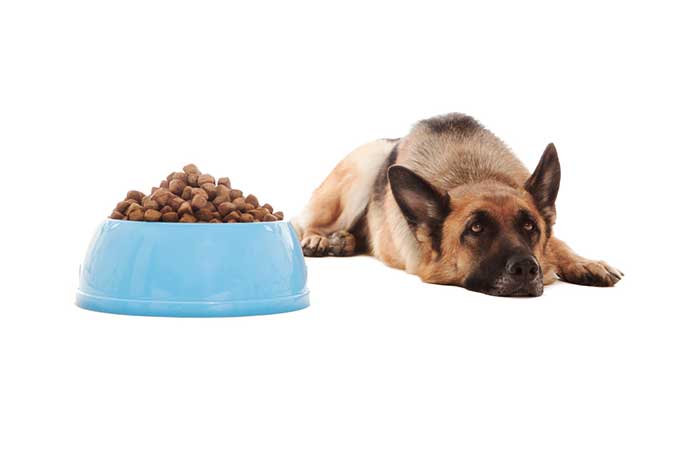
Is your sweet dog turning up its nose on the food you’re serving her? Or is Charlie so used to being fed treats and scraps he’s not eating his food anymore?
It’s common for some dogs to be selective about their food. Other dogs (and breeds) are driven by food, while others are not so motivated by even the tastiest piece of meat.
Sometimes it just a question of personality and your pup may be one of those dogs who are a bit picky about what they eat. It may not be a problem at all if your dog still eats dog food that provides complete nutrition.
However, sometimes picky eating becomes a problem. Maybe there is something in the food your dog doesn’t like, or perhaps they are used to getting so many treats they are simply not hungry. Medical issues can also be a reason for concern if your dog suddenly stops eating.
Let’s find out more about what you can do to resolve the problem.
Why Are Some Dogs Finicky About Their Food?
Dogs can be picky eaters for the same reasons as humans: they just prefer to eat food that tastes better. The problem can also be behavioral. Why eat something you don’t like if holding off eating will result in the owner getting out a bag of treats or giving in to some delicious scraps from the table.
Often the dog is not to blame for being selective with their food, and the problem is actually at the other end of the leash. If you feed your dog treats or cuttings throughout the day, it will have no reason to eat dog food. Minimize the treats and snacks, and you may find your dog suddenly taking a liking to their normal food.
Treats are not a problem if they supplement an otherwise nourishing diet and are healthy. Instead of dog treats, you can try veggies and fruits that contain nutrients your dog needs. Although most vegetables and fruits are safe for your dog, you should always check a vet-approved source like FeedingMyPet before introducing any new foods.
Treats only become a problem when they are not healthy, or they are given too often, resulting in a dog that isn’t interested in its food.
If your dog just happens to be somewhat picky about what he’s eating, but
- His diet is balanced
- He’s eating AAFCO-approved dog food
- He is active and healthy
- He has an average body weight
- His coat is shiny,
then you probably have nothing to worry about. It’s natural for dogs to find other foods more appetizing than others.
However, if your canine friend refuses to eat nutritionally good dog food, he may develop deficiencies of essential nutrients and risk severe health issues.
Picky eating can also be a sign of medical problems. If your dog refuses to eat or is undereating, it’s essential to see the vet rule out digestive, dental, and other such problems. If refusing to eat has led to your dog being underweight, it’s critical to have the pup examined by a vet for any medical conditions.
What Should I Feed a Picky Dog?
With picky dogs, it more important than ever that you feed them high-quality commercial dog food that contains all the nutrients your pooch needs and offers them a balanced diet.
You can try out different textures and flavors to see if there is something your dog prefers. It can also be a good idea to choose a dog food with only a few ingredients. It will minimize the chance of the food, including something that puts your dog off. Even the size of the kibble may be the issue.
You could also try canned food instead of dry food, or even try mixing both. Adding water, the gravy from canned foods, or chicken broth to dry kibble can also make it more appealing to some dogs and encourage them to eat
Dog foods today are highly palatable, and most dogs are happy to eat whatever you put in front of them. However, there are many options available, from kibble to canned foods, semi-moist food in pouches, and freshly packaged gourmet meals. Although you may want to treat your dog to some of the tastier premium choices, it may sometimes be the root of the problem. Why would your dog like to eat kibble when he knows there’s a chance of getting something even better and that gourmet meal might be waiting just around the corner?
Suppose you feed a selective eater a homemade diet. In that case, chances are you’re not providing a nutritionally balanced diet because your dog is refusing to eat foods that may contain essential vitamins and nutrients. If you want to feed something other than commercial dog food that has been approved by the AAFCO, you should ask a dog nutritionist or vet to give you specific instructions on how to provide your pet with balanced nutrition.
What Else Can I Do to Help My Dog Overcome Selective Eating?
In many cases, the problem is pretty easy to solve if you stay determined. Choose a tasty dog food you offer your dog and deny him any treats or scraps. Dogs can go up to a week without eating, but usually, it doesn’t take very long before the natural survival instincts kick in with the hunger, and your dog is willing to eat whatever is on offer.
Another option is to offer food a couple of times a day and leave it for 15-120 minutes. If your dog doesn’t eat, remove it and try again at the next mealtime. This may encourage your dog to eat because food is not always available.
Remember that if you suspect a medical condition is a reason for picky eating, it’s best to consult a vet.
The most important thing is to resist the temptation to cave in when your dog looks at you with those sad puppy eyes. In the end, ensuring your pet is being fed nutritionally sound food that meets their dietary requirements is what is expected from a responsible pet parent.
By staying tough, you will be doing your dog better than just giving him those unhealthy treats he is hoping for.



